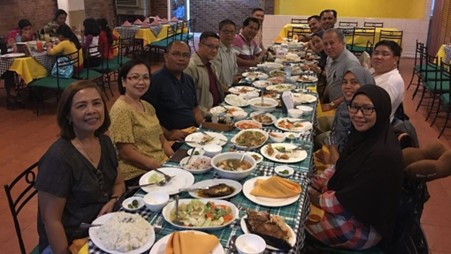Working in collaboration to improve lives and community
(The Star, 26 November 2021)
With a common interest to improve lives, Universiti Teknologi PETRONAS (UTP) has initiated collaborations with institutions of higher learning (IHLs) and government agencies in the Philippines to better the lives of communities in both countries through technology.
A purpose-driven partnership best describes the collaborations UTP has forged in recent years through its Philippines-Malaysia Institutional and Industrial Initiatives (PMIII). Using technology as an enabler, UTP and its partners – made up of IHLs, government ministries and agencies in the Philippines – complement each other’s expertise, competency and knowledge to come up with novel solutions in areas such as education, renewable energy, water resources, health and agriculture, to name a few.
The first seeds of PMIII were planted back in 2017 when Palawan State University sent four of its faculty members for postgraduate studies at UTP. That same year, UTP received a visit from the Department of Science and Technology (DOST) secretary Fortunato de la Pena, further cementing the ties between UTP and the Philippines.
From the time UTP’s Research, Innovation and Commercialisation deputy vice chancellor Prof Ir Dr Mohd Shahir Liew first strategised the PMIII roadmap, various projects have taken off, including solar desalination, wave renewable energy technology, wearable health sensors for peak performance athletics, biomaterials and halal blockchain for the Philippine cocoa industry.
UTP's Research, Innovation and Commercialisation deputy vice chancellor Prof Ir Dr Mohd Shahir Liew (right) establishing collaboration and friendship with University of Santo Tomas vice rector Prof Maribel Nonato.
UTP’s partners in the Philippines have included government ministries namely DOST, technology companies like Analog Devices and IHLs that include the University of Santo Tomas, Mapúa University, Ateneo de Davao University, University of Southeastern Philippines, Mindanao State University-Iligan Institute of Technology and Palawan State University, among others.
Ts Dr Ho Tatt Wei, who is one of two project managers overseeing UTP’s collaborations in the Philippines, says besides technology projects, the partnerships also extend to student exchange programmes, research symposium, boot camps, webinars and even an invitation as visiting professor for Mohd Shahir.
Highlighting a recent collaboration in the area of renewable energy, Ts Dr Noridah Osman, the other project manager for UTP’s projects in the Philippines, points to the UTP-Mapúa University Renewable Energy International Virtual Summer School Programme 2021 held from Sept 25 to Oct 16, which marked the first short course and forum organised by the two universities.
She adds that this is a follow-up from last year’s ‘Mini Colloquium on Renewable Energy’. Three main areas will be explored in the future, including joint publications, technology transfer and commercialisation of products and integration of research into the community.
Other collaborations in the pipeline include exploration into battery technology for renewable energy, the use of automation and artificial intelligence in agriculture and a cost-competitive pico-turbine for hydroelectricity generation in rural areas.
Synergistic relationship
Mohd Shahir (front) sharing proud moment with the first graduating batch of DOST-Science Education Institute (SEI) scholars at UTP Convocation Ceremony in 2018 from Palawan State University (PSU) together with Director Dr Biyo and leadership from PSU, president Ramon Docto and vice president Dr Francis Tuquero.
Integral to the success of the collaborations to date is the shared commitment between UTP and its partners, which to an extent has helped to mitigate the challenges of forging a relationship separated by distance and differing working styles and cultures.
Even the Covid-19 pandemic and ensuing movement restrictions and closure of international borders have not dampened the mood or enthusiasm.
“We were inspired by Prof Shahir’s aspirations for the partnership. He views Asean partnership as a source of wealth and security for this region, so we all worked to play our part in sustaining and protecting the partnership,” says Noridah.
Ho agrees, adding, “There exists a commitment to really solve real and important problems and along with mutual trust, this is a powerful force that helps us to communicate easily and collaborate to solve problems that impact the people and communities of both countries. It’s this shared ethos that drives UTP and our partners.”
For UTP, the collaborations are beyond just an opportunity to find a market for its innovations.
“Our partners in the Philippines are true and equal technology partners with complementary expertise. It’s a true synergistic collaboration where we help each other to dismantle procedural and border barriers,” Ho says, acknowledging that UTP has also been able to secure complementary know-how to plug some of its expertise gaps.
In it for the long haul
In adopting a long-term perspective in its collaborations, Ho reiterates that UTP is in it for the long haul. “This is a true long-term partnership and the goal is nothing else but human empowerment and job creation, with technology as the enabler.
“We have unique problems in this region that the developed countries in the West may not be inclined to address, for example, in the renewable energy space local resources differ from those in Europe. So, there’s scope to develop fit-for-purpose technologies for the needs of the Southeast Asian region,” he adds.

Fellowship with Mindanao State University-Iligan Institute of Technology leadership after a long day of discussions on partnerships.
The collaborations have also served as a joint platform to empower both sides. “We use the lens of joint prosperity and adopt the better-thy-neighbour model. So, we’re continuously looking for ways we can expand this long-term friendship, because it’s only through friendship that there is space to explore solutions in the interest of both countries.”
Apart from continuously exploring collaborations with other institutions of higher learning, UTP is also keen to work with corporations and companies as well as government agencies and other stakeholders.

